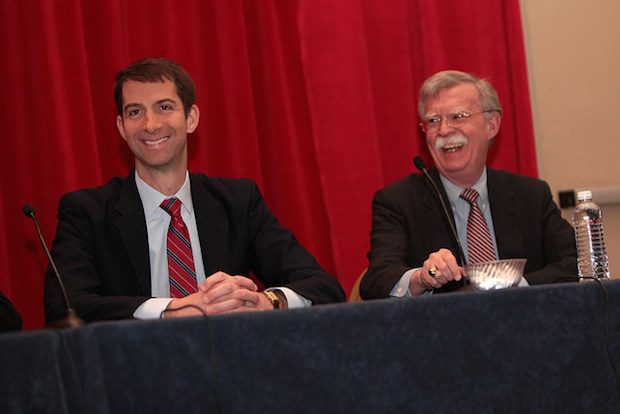A Real Choice on Iran

Remember the old talking point? Negotiations with Iran and war are what President Obama might call a “false choice.”
“What I don’t appreciate is when I hear remarks out of the White House spokesman that… if we’re pursuing sanctions we’re marching the country off to war,” New Jersey Democratic Sen. Robert Menendez said in response to the argument that additional sanctions would blow up the nuclear talks.
“The idea that the only alternative to accepting a capitulation-ist negotiation, which is what we are offering Iran, is war is… false,” argued the columnist Charles Krauthammer on Fox News. “Obama always says it is either what I am demanding, or war. It is not.”
“Now we’re being told that the only alternative to this bad deal is war,” said Israeli Prime Minister Benjamin Netanyahu in his address to Congress. “That’s just not true. The alternative to this bad deal is a much better deal.”
Out with the old, in with the new.
Joshua Muravchik is out with an op-ed in the Washington Post arguing war with Iran is “probably” the best option. (Expect his next piece to delete the “probably.”)
Muravchik deserves some credit for honesty, but this argument isn’t anything new. (It’s not even new for Muravchik, who was advocating much the same thing, during the nadir of the Iraq war—after the war had been repudiated by the voters in the 2006 midterms, no less.)
Correctly or not, Iran hawks are sensing that whatever hangover the country experienced after Iraq has been cured. They are slowly dropping the pretense about what their preferred alternative to diplomacy is.
Tehran’s pen pal Arkansas Republican Sen. Tom Cotton has publicly called for regime change, describing diplomacy as a “sham.”
“The policy of the United States should therefore be to support regime opponents and promote a constitutional government at peace with the United States, Israel and the world,” Cotton added, objectives that will be hard to realize in the near term through negotiations.
While Cotton, an Iraq veteran, added, “Only those who have not tasted war’s bitter cup would wish another sip,” he also said, “President Obama should make it utterly clear that Iran is not immune from military strikes and that the United States has the capabilities to severely set back Iran’s nuclear program because we do.”
Various lawmakers have already pushed for an authorization to use military force against Iran. They invariably claim that the resolution would just be a “tool” for Obama to make credible the threat of military force, but don’t believe it.
This was the excuse many Democratic hawks, including Hillary Clinton, used before voting for the Iraq war. They were just voting to give President Bush a fallback option in case diplomacy failed.
That isn’t how it worked out back then. It certainly isn’t what should be expected when you have so many members of Congress openly pining for negotiations to fail.
The hawks have learned nothing from the march to war with Iraq. Not only are they practically predicting another cakewalk (“we can strike as often as necessary”), they are minimizing the threat from the Islamic State to justify war against a major source of anti-ISIS boots on the ground.
This is reminiscent of post-9/11 hawkish arguments that prioritized attacking Saddam Hussein over fighting al Qaeda, the terrorist group that was actually behind the murder of 3,000 Americans.
A representative piece appearing in first issue of the Weekly Standard after the Twin Towers and the Pentagon were hit argued “it is probably not necessary to go to war with Afghanistan” and conceded “To be sure, Usama bin Laden and his organization should be a prime target of this campaign” while calling for war with Iraq.
At least Muravchik isn’t pretending we’d be greeted as liberators in Iran (“Wouldn’t an attack cause ordinary Iranians to rally behind the regime? Perhaps…”).
The outcome of the Iraq war was a freer hand for the kind of Sunni radicals who attacked the United States on 9/11, as well as more regional influence for Iran.
What’s to prevent a repeat of that fiasco from once again producing the opposition of its intended effect—in this case, a nuclear Iran?
The next question is whether skeptics of preventive war, especially on the right, will repeat their past mistakes as well. If they are going to effectively counter increasingly confident Iran hawks, they are going to have to do much better than what they are doing now.
W. James Antle III is managing editor of the Daily Caller and author of Devouring Freedom: Can Big Government Ever Be Stopped?
Comments